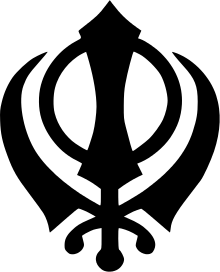Sikhism in Afghanistan

| This article is part of a series on |
| Sikhism |
|---|
 |
|
Sikh Saints
|
|
Philosophy
|
|
List
|
|
Sikhism portal Indian religions portal |
Sikhism in Afghanistan is limited to small populations, primarily in major cities, with the largest numbers of Afghan Sikhs living in Jalalabad, Kabul, and Kandahar.[1] These Sikhs are Afghan nationals and mostly Pashto-speakers,[2] though some also use Dari, Hindi or Punjabi.[3] Their total population is around 800 families[4] or 3,000 members.[5]
Presence
Kabul
Around 30000 Sikhs visit Gurdwara Karte Parwan, a primary place of worship in the area, located in the Karte Parwan section of Kabul.
Jalalabad
As of 2001, Jalalabad had 100 Sikh families, totalling around 700 people, who worship at two large Gurdwaras. Legend states that the older of the Gurudwaras was built to commemorate the visit of Guru Nanak Dev Ji.[6]
Kandahar
Kandahar has a small Sikh community.
History
Early history
Some early Khatri Sikhs established and maintained colonies in Afghanistan for trading purposes.[7] Later, conflicts between the Sikh misls and empire against the Afghan based Durrani Empire led to tension. Sikhs also served in the British Empire's military during several operations in Afghanistan in the 19th century.
Civil war
During the 1980s Soviet war in Afghanistan, many Afghan Sikhs fled to India, where the Sikh community is well-established; a second wave followed following the 1992 fall of the Najibullah regime.[2] Sikh gurdwaras (temples) throughout the country were destroyed in the Afghan Civil War of the 1990s, leaving only the Gurdwara Karte Parwan in Kabul.[8]
Under the Taliban, the Sikhs were a relatively tolerated religious minority, and allowed to practice their religion.[6] However, the Sikh custom of cremation of the dead was prohibited by the Taliban, and cremation grounds vandalised.[8] In addition, Sikhs were required to wear yellow patches or veils to identify themselves.
Karzai administration
By tradition, Sikhs cremate their dead, an act considered sacrilege in Islam.[9] Cremation has become a major issue among Sikh Afghans, as traditional cremation grounds have been appropriated by Muslims, particularly in the Qalacha area of Kabul, which Sikhs and Hindus had used for over a century.[9] In 2003 Sikhs complained to the Afghan government regarding the loss of cremation grounds, which had forced them to send a woman's body to Pakistan to be cremated, following which the Minister of Religious affairs investigated the issue.[2] Though the grounds were reported as returned to Sikh control in 2006,[8] though in 2007 local Muslims allegedly beat Sikhs attempting to cremate a community leader, and the funeral proceeded only with police protection.[9] As of 2010, cremation in Kabul is still reported as being disapproved of by locals.[10]
Sikhs in Afghanistan continue to face problems, with the issue of the Sikh custom of cremation figuring prominently. City development also threatens to destroy the Gurudwara Karte Parwan and adjoining shrine to Guru Nanak.
In September 2013, Afghan President Hamid Karzai signed a legislative decree, reserving a seat in the National Assembly of Afghanistan for the Hindu and Sikh minority.[11]
Diaspora
Before the 1990s, the Afghan Sikh population was estimated around 50,000.[8][12] As of 2013, they are around 800 families of which 300 families live in Kabul.[4] Sikh leaders in Afghanistan claim that the total number of Sikhs are 3,000. Awtar Singh is a Senator in Afghanistan, representing the Sikhs.[5] Most Sikh families emigrated to other countries including, India, North America, the European Union, the United Kingdom, Pakistan, and other places.
Notable Afghan Sikhs
- Awtar Singh, member of the National Assembly of Afghanistan[13]
- Anarkali Kaur Honaryar, member of the Afghan Independent Human Rights Commission and 2009 Radio Free Europe Afghanistan "Person of the Year"
- Jai Singh Khurana (Fani), the first Sikh member of the Afghan Parliament in Afghanistan in 1968 and his son Khajinder Singh Khurana who is now president of Afghan Hindu Sikh society in New delhi
References
- ↑ U.S. State Department. "Afghanistan - International Religious Freedom Report 2007". The Office of Electronic Information, Bureau of Public Affair. Retrieved 2009-07-04.
- ↑ 2.0 2.1 2.2 Majumder, Sanjoy (25 September 2003). "Sikhs struggle in Afghanistan". BBC News.
- ↑ Shaista Wahab, Barry Youngerman. A brief history of Afghanistan Infobase Publishing, 2007. ISBN 0-8160-5761-3, ISBN 978-0-8160-5761-0. Pg18
- ↑ 4.0 4.1 "Hindus, Sikhs warn of leaving Afghanistan". Pajhwok Afghan News. 2013-07-31. Retrieved 2013-09-27.
- ↑ 5.0 5.1 Sikhs struggle for recognition in the Islamic republic, by Tony Cross. November 14, 2009.
- ↑ 6.0 6.1 Sikhs set example for getting along with the Taliban. By Scott Baldauf, Staff writer of The Christian Science Monitor, 13 April 2001
- ↑ Hew McLeod (1997). Sikhism. New York: Penguin Books. p. 251. ISBN 0-14-025260-6.
- ↑ 8.0 8.1 8.2 8.3 "Sikhs, Hindus reclaim Kabul funeral ground - World - DNA". Dnaindia.com. 2006-01-08. Retrieved 2012-09-01.
- ↑ 9.0 9.1 9.2 Hemming, Jon. "Sikhs in Afghan funeral demonstration « RAWA News". Rawa.org. Retrieved 2012-09-01.
- ↑ "Sikhs, Hindus celebrate in Kabul". Pajhwok Afghan News. 2010-04-14. Retrieved 2012-09-01.
- ↑ http://www.pajhwok.com/en/2013/09/04/1-wolesi-jirga-seat-reserved-hindus-sikhs
- ↑ Jethra, Aashish (2010-08-27). "2 Sikhs in Afghan poll fray, want to be first elected non-Muslims". SikhNet. Retrieved 2012-09-01.
- ↑ Bogos, Elissa (2010-01-13). "Afghanistan: Dwindling Sikh Community Struggles To Endure In Kabul". SikhNet. Retrieved 2012-09-01.
External links
- Al-Jazeera report on Afghan Sikhs
- Interviews in the Old City of Kabul
- The Afghan Sikhs face new threat. Deccan Herald, 12 November 2010
- Afghan Sikhs: Forgotten Victims. The Guardian; 6 July 2010
- Afghanistan: Sikhs rebuilding gurdwaras. Gurinder Randhawa - Indo-Asian News Service 25 Aug 2005
- 300 more Afghan Sikhs flee, India waives visa terms. Times of India, Oct 20, 2001.
- A NATION CHALLENGED: LIFE IN KABUL; Keeping Their Faiths Under Taliban Rule Drew Sikhs and Hindus Together. Amy Waldman, New York Times, 20 January 2002
- Pakistan: The Embattled Sikhs in Taliban Territory
| ||||||||||||||
| ||||||||||||||||||||||||||||||||||